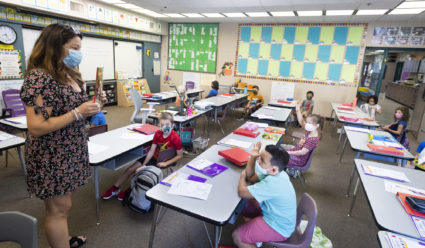Our October 2020 pick for Now Read This, the PBS NewsHour's book club with The New York Times, is Paul Tough's "Helping Children Succeed", which looks at the unique challenges that children who are dealing with adversity face when they enter the classroom, and how teachers and policymakers can work to improve these students' chances at success. Become a member of the Now Read This book club by joining our Facebook group, or by signing up to our newsletter. Learn more about the book club here.
Below are questions to help guide your discussions as you read the book over the next month. You can also submit your own questions for Paul Tough on our Google form. Tough will answer reader questions about "Helping Children Succeed" on the PBS NewsHour at the end of the month.
- The author finds that standardized testing, such as the SAT and ACT, is not a good predictor of a student's higher potential. Do you think these tests should be done away with?
- How might public education's emphasis on test scores over the years have reinforced already existing inequalities in America?
- Paul Tough writes about one study by Kirabo Jackson that found that teachers who were adept at helping students develop non-cognitive skills were not being recognized. Why do you think this is?
- Have you or your children ever had a teacher that has been successful in helping students to develop non-cognitive skills, such as grit and perseverance? If so, how did they approach this?
- Was there one educational program in particular in Tough's book that stood out to you as promising? If so, why?
- Tough writes of a disconnect between the "American public school system and the labor-force demands of the 21st-century American economy." Have you noticed this in your own career?
- Amid the pandemic, many children in adverse situations are struggling with remote learning from home. How do you think this could affect the U.S. education system in the long-term?
- In your view, which institutions are best equipped to make changes that would support the development and success of students from adverse situations?
- Did Tough's book make you think differently about how educational institutions in the U.S. should approach working with students living in adversity and their families? If so, how?
- How does Tough's research square with your own academic experiences growing up?
Support Canvas
Sustain our coverage of culture, arts and literature.

